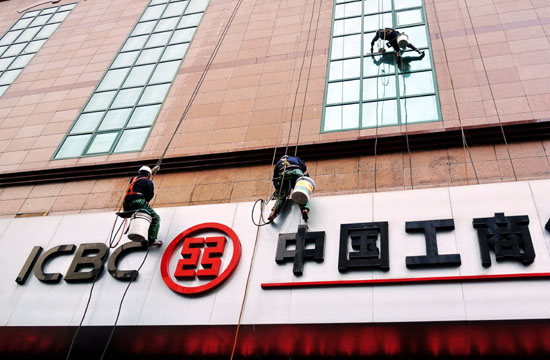Banks given positive outlook
Updated: 2013-02-06 09:36
By Oswald Chan in Hong Kong (China Daily)
|
||||||||
|
 |
|
An Industrial and Commercial Bank of China Ltd branch in Shanghai. CCB International Securities Ltd said in a report on Tuesday that mainland banks' net interest margin may decrease in the first quarter of this year, squeezing lenders' net profits. [Photo/China Daily] |
Report says sector to gain boost from flurry of solid economic data
Investment bank CCB International Securities Ltd remains upbeat on the domestic banking sector this year, amid a flurry of bullish data and research reports on the Chinese economy.
The research unit under the investment bank said in a report released on Tuesday that it believes that the country's financial regulatory bodies will be accommodative in the implementation of new policies and that the domestic economic growth will be sustained.
In its 2013 China Banking Outlook report, CCB International said that domestic banks have a substantially reduced likelihood of being affected by further regulatory-policy risks and concerns of a sharp domestic economic slowdown.
Regarding regulatory risks, the bank said that, while it expects the China Banking Regulatory Commission to keep a close eye on potential risk factors in the banking system, the regulator will also be more accommodative in terms of new policy implementation.
The report said that the domestic economy should grow 8 percent in 2013, which should lend support to the profit growth of domestic banks.
The People's Bank of China, the country's central bank, cut interest rates twice in 2012 to boost the domestic economy.
In further positive news, on Tuesday, the HSBC China Services Purchasing Managers' Index, or PMI - an index used to gauge the expansion of the domestic services industry - rose to 54 in January from 51.7 in December, the fastest growth rate in four months. A reading above 50 indicates expansion.
"As the employment index remains robust, and the outstanding business index is still hovering at a high level, we expect the China services PMI to further improve, indicating the Chinese economy has already bottomed out in the last quarter, which paves the way for a solid economic rebound," said Qu Hongbin, HSBC's chief China economist.
French bank Credit Agricole echoed that view.
Dariusz Kowalczyk, Credit Agricole senior economist and strategist, said: "The improvement of the China services PMI confirms solid growth momentum in the first quarter of this year and should be supportive for sentiment. We continue to expect 8.5 percent economic growth in 2013 and see 8.6 percent growth on a yearly basis in the first quarter of this year."
The eurozone debt crisis will remain the primary risk factor that may hit Chinese banks, according to the CCB International report, as the crisis may increase investors' risk aversion, which may lead to a fall in share prices.
However, amid the overall bullish stance toward the domestic banking sector, CCB International cautioned that Chinese banks' net interest margins, or NIM, may decrease modestly due to re-pricing pressures in their loan portfolios, and talked about the possibility of an interest rate hike.
"Chinese banks' NIM may fall by about 10 to 15 basis points in the first quarter of 2013 on a quarterly basis due to the downward re-pricing of corporate loans, residential mortgages and car loans. Larger banks may face greater quarter-on-quarter NIM compression compared with the smaller banks," CCB International Research Director Sheng Nan said at a news conference in Hong Kong on Tuesday.
"The other risk is that if inflation increases, interest rates may rise again and the banks' NIM levels may be further compressed, which could squeeze their net profits," Sheng warned.
The CCB International report also forecast that Chinese banks will lend out a total of 8.5 trillion yuan ($1.36 trillion) in 2013, a modest year-on-year increase.
It added that banks will likely maintain a cautious view toward export-focused manufacturers, textile firms, solar and wind energy companies, and steel trading and shipping firms. The cement and property sectors may get more favorable responses as both are tied to China's ongoing urbanization boom.
oswald@chinadailyhk.com











